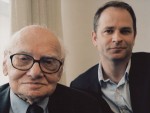Column Name
Title
Milton Babbitt, 94, one of the most influential composers and music theorists of the 20th century, died on January 29 in Princeton, N.J., where he had lived for many years. Babbitt, a member of the Juilliard composition faculty from 1971 to 2008, was born in Philadelphia on May 10, 1916. He grew up in Jackson, Miss., and started studying the violin at age 4. When he was 16, Babbitt was exposed for the first time to the serialism of Arnold Schoenberg, which became a major influence on his work as a composer. He received his bachelor’s degree at New York University and his master’s degree and Ph.D. from Princeton University, where he was on the faculty from 1938 (at which point music classes were taught in the department of art and archaeology because there was no music department) to 1984. His wife, Sylvia, died in 2005; his survivors include a daughter, Betty Anne Duggan, and two grandchildren.
Body
While his music was, by his own admission, complex and even thorny, Babbitt was an acclaimed teacher who was known to be open to all sorts of musical styles. Faculty member Jonathan Dawe (M.M.’91, D.M.A. ’95, composition) recalls his former teacher.
I was there 13 years ago at the premiere of Milton Babbitt’s Second Piano Concerto at Carnegie Hall. The new work opened with a delicate unfolding in the piano of three-note chords that changed their shape and color while pivoting upon a common tone. What I sensed to be the kaleidoscopic effect of an all-trichord series quickly merged into stately exchanges between elegant orchestral passages and playful piano interludes, all shaped into a single-movement composition of almost Classical concept. I was also there at its conclusion in which after initial applause, some hisses seeped in; positive support then took over, yet bolder boos battled back, only to be swamped by a final wonderful wave of cheers for this great piece. That a composer in the late 20th century could still stir such passion in all directions, I found moving. It was certainly not his intent but it was somehow significant, making the music for me all the more vital, meaningful, and part of its time. While Milton’s stories of the past always suggested the future, he was thoroughly contemporary. For me, Milton existed in the present, as did his music.
I met Milton Babbitt in 1989 when I started my graduate studies at Juilliard. As a composition teacher, he was formidable. He would become fully involved in a student’s work, often sitting silent for some time as he would “listen” through a given composition “in progress.” His intrinsic awareness of students’ work would leave him excited, eager to see what new developments would come the following week. He had great enthusiasm, and this was significant. If Babbitt was intrigued—or better yet, charged up—about what you were composing, then you felt all the more empowering to forge ahead. Being a creative artist is difficult, especially as a student; Babbitt was key in instilling in students great confidence, and often courage. Despite his known apprehensions concerning the troubled state of serious art music in our culture, he was in reality a tremendous optimist, placing so much of his hope and energy on young composers. He appreciated and found delight in music—all types of music, contrary to common conception. Although he was discerning, his curiosity was always at work. He championed innovation in compositional thinking, regardless of “style.”
But beyond being a powerful pedagogue, Babbitt was first and foremost a composer, and it was his role as a remarkable creative artist that I so deeply recall. He was always engaged creatively and was never private about his own composition. Working closely with him, one would share in this excitement from the inception of a piece—the practical issues, the conceptual concerns, and the days (and nights) of composing that led to the premiere; it was a deeply human experience.
The variety, energy, and elegance of his many works was great. The beginnings of his compositions were—for me—always the most powerful part. He presented the strongest material first, revealing the masterful mechanics of how each piece would work. The composition would then chart a course of graceful maximal diversity till all was exhausted. Shortly after Milton’s death, a colleague mentioned with great respect how he had passed with grace and calm, just as he ended all his pieces. Sylvia (Milton’s dear late wife) frequently said that “all of Milton’s pieces end quietly,” and Milton would often add with a laugh, “True, I always go out with a whimper.” To me, his concluding filigrees, imbued with refinement, brevity, and wit resonate with the life of each work.
It is impossible to fully express the feeling of loss with which I and so many others are now left. He was so meaningful in shaping the way we listened to, conceptualized, and spoke about music, but he also dealt simply and profoundly with life. His influence is great and will continue to flower. I am drawn to cite, in the spirit of Babbitt, the epitaph for the early Renaissance composer John Dunstaple, in part because he was also a great mathematician, but also, because I know the idea would make Milton smile: “Thus here was MB. He had secret knowledge of the stars and scattered his sweet art throughout the world.”





